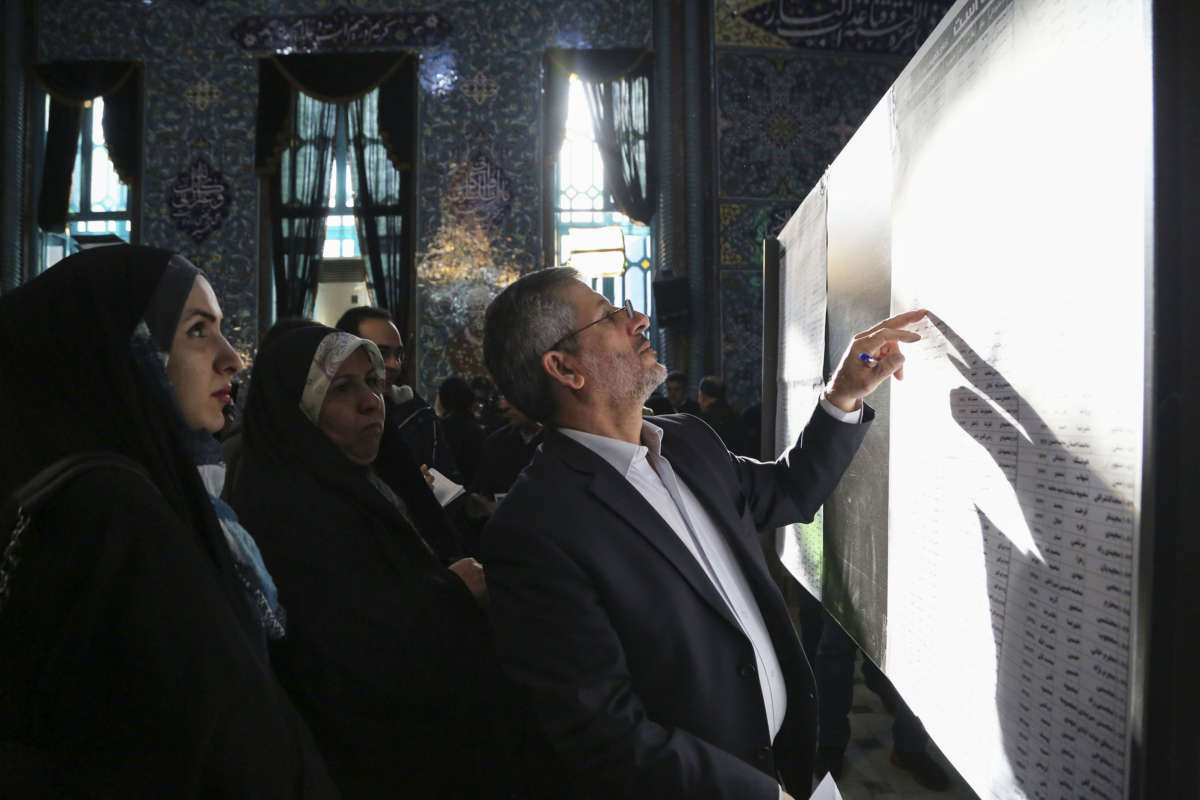TEHRAN — The landslide victory for hardliners in Iran’s recent parliamentary elections confirms that whoever occupies the White House next year won’t have an easy time dealing with Iran.
Many Iranians were already angry at President Donald Trump’s unilateral withdrawal from the nuclear accord, imposition of harsh sanctions and the Jan. 3 assassination of the popular military leader Qassem Soleimani. And they showed that anger at the polls.
Hardliners, known here as principalists, won 220 of 290 seats in the parliament and got all 30 seats representing Tehran, usually a bastion of more reform-minded voters. The reformists, who advocate closer ties with the United States, were eliminated as a significant parliamentary force. While voter turnout was unusually low, both principalists and reformers came out swinging against Trump.
Retiree Hasan Muhamdi, who identifies as a principalist, told Truthout, “We all vote for the love of Soleimani. It’s a punch in the face of Trump!”
While Iranian leaders want to avoid direct military confrontation with the U.S., they are likely to encourage local armed groups to attack U.S. and allied targets in the region. Iranian allied rebels in Yemen, for example, claimed credit for the sophisticated drone and missile attack on the ARAMCO oil facility in Saudi Arabia last September.
“The people who destroyed ARAMCO could do it again,” said Mohammad Khodadi, deputy minister of Culture and Islamic Guidance, in an interview.
The U.S.’s harsh sanctions on Iran and the Soleimani assassination strengthen the hand of the principalists, who proudly uphold the original, hardline principles of the 1979 Iranian Revolution, including its emphasis on theocratic government and staunch opposition to U.S. imperialism.
“What the American president did was unify the Iranian people and took things to a different level,” said Nader Talebzadeh — a principalist leader and host of an influential TV show — in an interview with Truthout.
The view in Washington is quite different. Trump administration officials are convinced that harsh U.S. sanctions are working. They see Iranian leaders as weak, beset by economic problems and buffeted by anti-government demonstrations.
Tehran faces a “financial crisis and its worst political unrest in its 40-year history,” according to Brian Hook, the State Department’s special representative on Iran.
Paul Pillar, a former CIA officer and Iran expert at the Center for Security Studies of Georgetown University, said in a phone interview with Truthout that some in the Trump administration “genuinely believe this regime is teetering and the end is near. We’ve heard this numerous times over 40 years. It’s a mistaken impression.”
Iran does indeed face an economic crisis brought on by unilateral U.S. sanctions and made worse by corruption and mismanagement. Inflation hit 25 percent as of February and the country’s economy shrank 9.5 percent last year.
And now Iran faces the spread of the coronavirus, with 77 confirmed deaths as of this writing, the second-highest tally in the world after China. One of Iran’s vice presidents was infected and a top advisor to the country’s Supreme Leader has died from the virus.
Iranian officials acknowledge the multiple crises facing the country, but point out that Iran suffered far more during the 1980-88 Iran-Iraq War, in which an estimated 1 million Iranians died. The Trump administration will never achieve regime change, according to Deputy Minister Khodadi.
“America is a specialist in removing, but not at creating,” Khodadi said in an interview, referring to the U.S.-led collapse of governments in Iraq, Afghanistan and Libya.
“The Iranian people know who to blame for the current crises: Trump.”
Iranians also appear to be united on the efforts of Hassan Rouhani, the centrist president, to pressure the U.S. and Europeans to live up to the nuclear accord, known as the Joint Comprehensive Plan of Action. Trump withdrew from the JCPOA in 2018 and imposed harsh, unilateral sanctions. For one year, Iranian leaders tried to convince their European counterparts to ignore the sanctions and engage in normal trade.
Britain, France and Germany even set up a special body to promote trade. But as a result of U.S. pressure, INSTEX — Instrument in Support of Trade Exchanges — has yet to facilitate a single trade deal.
So Iran began breaking various terms of the JCPOA, including enriching and stockpiling uranium at amounts that exceed JCPOA limits.
Principalist leader Talebzadeh said Iran is not trying to build a nuclear bomb. He notes that Supreme Leader Ali Khamenei issued a fatwa, or religious decree, against ever building a nuclear weapon. He said breaking some of the JCPOA conditions is a pressure tactic.
“We will not build a bomb,” he said. “It’s a move to intimidate the west.”
While Iranians are united against Trump, they hold different views about a possible successor.
Retired truck driver David Nuri voted for the reformists in the parliamentary elections, hoping to elect leaders who could improve the economy and relations with the U.S. Nuri thinks the upcoming U.S. election could have a real impact on U.S.-Iran relations. He strongly criticized Trump for imposing unilateral sanctions that hurt ordinary Iranians.
“Obama was a little better,” said Nuri, because Obama agreed to the nuclear accord. “Trump is much worse. Republicans are war mongers. Democrats want peace.”
Reza Roosta Azad, a former chancellor at the Sharif University of Technology and prominent principalist, disagreed. “I don’t think there’s a difference between Democrats and Republicans, only the appearance is different,” he said in an interview.
“Obama’s views were hidden,” he continued. “Trump is more clear and transparent.”
Iranian leaders, like people around the world, want to know who becomes the Democratic Party nominee and who wins in November. Iran elected its hardliners and Iranians are waiting to see if the U.S. does the same.
Media that fights fascism
Truthout is funded almost entirely by readers — that’s why we can speak truth to power and cut against the mainstream narrative. But independent journalists at Truthout face mounting political repression under Trump.
We rely on your support to survive McCarthyist censorship. Please make a tax-deductible one-time or monthly donation.
